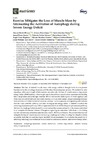Identificador persistente para citar o vincular este elemento:
https://accedacris.ulpgc.es/jspui/handle/10553/58122
| Título: | Exercise Mitigates the Loss of Muscle Mass by Attenuating the Activation of Autophagy during Severe Energy Deficit | Autores/as: | Martin Rincon, Marcos Pérez-López, Alberto Morales Álamo, David Perez Suárez,Ismael De Pablos Velasco, Pedro Luis Pérez Valera, Mario Perez-Regalado, Sergio Martinez-Canton, Miriam Gelabert Rebato, Miriam Juan-Habib, Julian William Holmberg, Hans-Christer López Calbet, José Antonio |
Clasificación UNESCO: | 241106 Fisiología del ejercicio | Palabras clave: | Autophagy-lysosome Caloric restriction Protein degradation Skeletal muscle Ubiquitin-proteasome |
Fecha de publicación: | 2019 | Proyectos: | Viabilidad y Sostenibilidad Del Adelgazamiento Mediante Tratamiento Intensificado en Pacientes Con Sobrepeso U Obesidad: Mecanismos Neuroendocrinos y Moleculares | Publicación seriada: | Nutrients | Resumen: | The loss of skeletal muscle mass with energy deficit is thought to be due to protein breakdown by the autophagy-lysosome and the ubiquitin-proteasome systems. We studied the main signaling pathways through which exercise can attenuate the loss of muscle mass during severe energy deficit (5500 kcal/day). Overweight men followed four days of caloric restriction (3.2 kcal/kg body weight day) and prolonged exercise (45 min of one-arm cranking and 8 h walking/day), and three days of control diet and restricted exercise, with an intra-subject design including biopsies from muscles submitted to distinct exercise volumes. Gene expression and signaling data indicate that the main catabolic pathway activated during severe energy deficit in skeletal muscle is the autophagy-lysosome pathway, without apparent activation of the ubiquitin-proteasome pathway. Markers of autophagy induction and flux were reduced by exercise primarily in the muscle submitted to an exceptional exercise volume. Changes in signaling are associated with those in circulating cortisol, testosterone, cortisol/testosterone ratio, insulin, BCAA, and leucine. We conclude that exercise mitigates the loss of muscle mass by attenuating autophagy activation, blunting the phosphorylation of AMPK/ULK1/Beclin1, and leading to p62/SQSTM1 accumulation. This includes the possibility of inhibiting autophagy as a mechanism to counteract muscle loss in humans under severe energy deficit. | URI: | https://accedacris.ulpgc.es/handle/10553/58122 | ISSN: | 2072-6643 | DOI: | 10.3390/nu11112824 | Fuente: | Nutrients [ISSN 2072-6643], v. 11 (11), 2824 |
| Colección: | Artículos |
Citas SCOPUSTM
21
actualizado el 08-jun-2025
Citas de WEB OF SCIENCETM
Citations
23
actualizado el 15-feb-2026
Visitas
313
actualizado el 15-ene-2026
Descargas
204
actualizado el 15-ene-2026
Google ScholarTM
Verifica
Altmetric
Comparte
Exporta metadatos
Los elementos en ULPGC accedaCRIS están protegidos por derechos de autor con todos los derechos reservados, a menos que se indique lo contrario.
